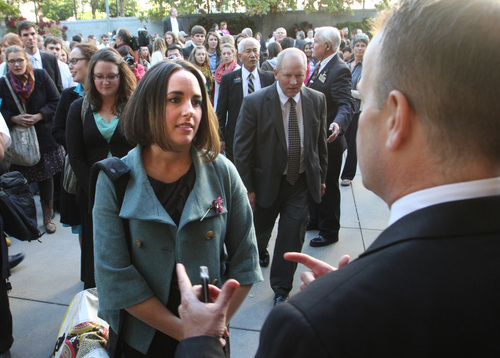This is an archived article that was published on sltrib.com in 2014, and information in the article may be outdated. It is provided only for personal research purposes and may not be reprinted.
On Monday, the Deseret News published the entirety of a letter written by church spokesperson Jessica Moody to Ordain Women, an organization that advocates for women's ordination to the Mormon priesthood.
Female members of Ordain Women have publicly requested admittance to the Mormon general priesthood session to be held on April 5. Ordain Women has stated that the organization's objective is not just to attend the all-male priesthood session, but to faithfully request equal female access to the Mormon priesthood and all Mormon leadership positions.
Moody's letter is addressed to Ordain Women, and its language is directed to members of the organization. Its public distribution indicates, however, that the letter is intended to be more than a private correspondence. Rather, it appears to be a calculated public statement made by a church spokesperson for the purpose of affecting public opinion.
Regardless of its overtly specified audience, its public function is to influence those watching the media's coverage of Ordain Women's request.
Public statements, in principle, should assert official organizational positions. This letter, functioning as a public statement but composed, instead, as a private correspondence, not only clarifies official positions, but also deprecates the women to whom it is addressed through using language that publicly minimizes them and their cause.
It publicly devalues the organization and its assertions that the disparity in decision-making authority between Mormon women and men is unacceptable.
For example, Moody's letter implies that the women requesting ordination do not appreciate the work of female Mormon leaders who have prepared a women's session to discuss the "ennobling and eternal doctrines relating to women" and directly states that the Ordain Women event will "detract from the sacred environment of Temple Square and the spirit of harmony sought at General Conference."
It relegates their petitions for ordination to the level of demonstrations by requesting that the women remain in free-speech zones rather than approaching priesthood session doors. Its final sentence, "Again, we hope that you will … contribute to the strength of sisterhood in our communities" would be an honest plea for support if the letter had been private, but as a public communication it shames the women who are seeking equality by insinuating that their actions detract from, rather than contribute to, the strength of Mormon women.
Most demeaning perhaps, is the letter's intent to publicly minimize the Ordain Women movement by drawing attention to the fact that "women in the church, by a very large majority, do not share … advocacy for priesthood ordination for women and consider that position to be extreme."
If this letter really were a private communication rather than a published declaration, the relative size of the movement could be construed to be a statement of fact. As a public communication, however, it acts, instead, like an attempt to intimidate a minority population into submission through drawing attention to their minority status. It communicates to members of the majority that they have no reason to take the pleas of the minority seriously.
Public statements are more ethical when they address principles and official positions rather than people and organizations. Making a public assertion in the form of a private letter degrades those to whom the letter is addressed, especially when the words of the letter minimize the position of the addressees. Public statements should be written as public communications and private letters should be kept outside the eye of the media.
Private dealings should not be intentionally released to media for the purpose of minimizing positions of minority populations. Such tactics are immoral and do not bolster the credibility of those who employ them.
Anne McMullin Peffer is founder and president of Circling the Wagons, a public charity that supports minority Mormons. She has no affiliation with the Ordain Women organization or movement.



